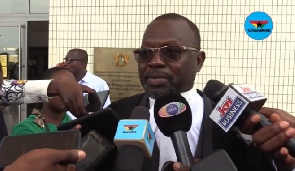 Former Deputy Attorney General, Dr Dominic Ayine
Former Deputy Attorney General, Dr Dominic Ayine
A former Deputy Attorney General, Dr Dominic Ayine, has said President Nana Addo Dankwa Akufo-Addo took the right decision in announcing a lockdwon of some of parts of the country, as part of measures in dealing with the spread of the pandemic but argues that the President relied on a “problematic” law to do so – the Imposition of Restrictions Act, 2020 (Act 1012).
Dr Ayine explained that the President could have relied on Article 31 of the Constitution to declare a state of emergency in this matter, then Parliament will determine the scope and content of that declaration.
Parliament, he said, will then hold him accountable if he exercises those powers contrary to what the Constitution says. But that cannot be done now since the President used a different law.
President Nana Akufo-Addo announced further restrictions of movement within the Greater Accra and Ashanti Regions on Friday night.
To this effect, movement in Accra and Kumasi will be restricted from 1 am Monday.
In his fourth address to the nation on the virus, Mr Akufo-Addo urged residents living in the affected areas to comply with the lockdown.
However, essential services have been exempted from the lockdown.
He identified Accra, Tema, Kasoa and Kumasi as the hotspots of the virus.
“The oath of office I swore on February 2017 demands that I dedicate myself to the service of Ghanaian people. It is my job to protect you and I am determined to do just that”, the President said, adding: “We have succeeded in stopping the importation of the disease into the country.”
“However, prevailing circumstances mean stricter measures need to be put in place to stop the spread of the virus in-country in Accra, Tema, Kasoa and Kumasi,” he added.
So, effective 1 am on Monday, 30th March, some forty-eight hours from now, I have imposed, pursuant to the powers granted the President of the Republic, under the Imposition of Restrictions Act, 2020 (Act 1012), restrictions on movement of persons in the Greater Accra Metropolitan Area (GAMA, which includes Awutu Senya East), and the Greater Kumasi Metropolitan Area and contiguous districts, for a period of two (2) weeks, subject to review. It will give us the opportunity to try to halt the spread of the virus, and scale-up effectively contact tracing of persons who have come into contact with infected persons, test them for the virus, and, if necessary, quarantine and isolate them for treatment, should they prove to have the virus", the President said.
Speaking on this matter in an interview with Ekow Annan, Class 91.3FM’s parliamentary correspondent, the Bolgatanga East lawmaker said: “What the President has done is in order. My only problem, as I keep emphasising, is that the powers being exercised now are purportedly being exercised pursuant to the Imposition Restrictions Act, which the President signed into law last week. For me, that law is highly problematic.
“I will continue to emphasise the fact that the President would have been better served by coming under 31 of the Constitution declaring a state of emergency and having parliament determine the scope and content of his declaration.
“Then parliament will hold him to account if he exercises any powers in a manner that is contrary to the Constitution.”